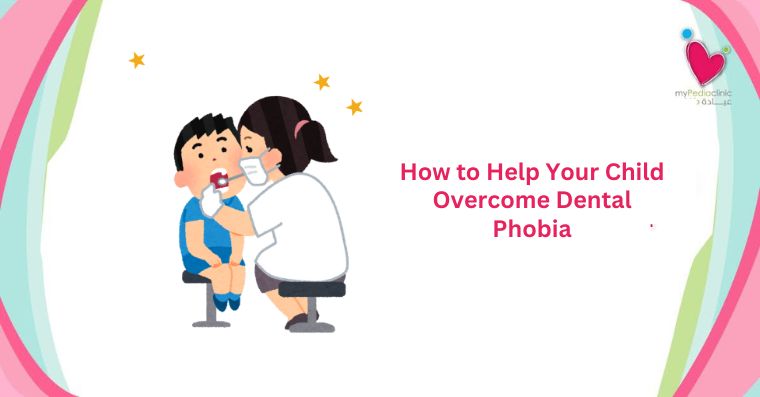Understanding Dental Phobia in Children
Fear of dental visits is common among children in Dubai, and it often starts at a young age. The idea of sitting in a big chair, hearing strange sounds, and meeting someone with sharp tools can be unsettling. For parents, this fear can lead to stress when scheduling appointments and ensuring their child receives necessary dental care.
Thankfully, there are proven ways to ease a child’s worries and turn dental visits into calmer experiences. With patience, encouragement, and the right professional care, children can overcome dental phobia. Visiting a pediatric dentist in Dubai who specializes in treating anxious children also helps build comfort and trust.
Dental phobia in children usually stems from several sources:
- Fear of pain or discomfort during procedures
- Previous negative dental experiences
- Stories they hear from friends or siblings
- Unfamiliar sights, sounds, and smells in the dental office
- Feeling out of control in the dental chair
- Parental anxiety that transfers to the child
Even cartoons or movies can make dental visits seem scary. Understanding these triggers is the first step toward helping children feel more comfortable and developing strategies to address their specific fears.
Some children also worry because they don’t fully understand what will happen at the dentist. The unknown can feel more frightening than reality. Explaining things in simple, child-friendly words makes the process feel less mysterious and more predictable, giving children a sense of control.
Preparing Your Child Before the Visit
Preparation makes a huge difference in reducing dental phobia. Parents can explain what will happen in simple, positive words. For example, saying “the dentist will count your teeth” sounds far less scary than “the dentist will check your cavity.”
Effective Preparation Strategies:
1. Use Age-Appropriate Language
Choose your words carefully when discussing dental visits. Avoid terms like “shot,” “drill,” “pain,” or “hurt.” Instead, use phrases like “tooth counter,” “tooth cleaner,” “sleepy juice,” or “gentle pressure.” This linguistic approach reduces fear triggers.
Examples of positive language:
- “The dentist will take pictures of your teeth” instead of “You need X-rays”
- “Your tooth will feel sleepy” instead of “This might hurt”
- “The dentist will clean your tooth with water” instead of “The drill will remove decay”
- “You’ll feel a little tickle” instead of “You’ll feel some discomfort”
2. Educational Resources
Reading children’s books about dental visits or showing fun videos also helps. Kids enjoy learning through stories and pictures, which can make the experience seem normal. Many pediatric dentists in Dubai recommend specific books that present dental care positively.
Popular children’s dental books include:
- “Going to the Dentist” by Anne Civardi
- “Curious George Visits the Dentist”
- “The Berenstain Bears Visit the Dentist”
- “Open Wide: Tooth School Inside” by Laurie Keller
3. Role-Playing at Home
Role-playing at home with a toy dentist kit can also make the process feel like a game. Let your child take turns being the dentist and the patient. This playful approach familiarizes them with dental procedures in a safe, controlled environment.
Role-play activities:
- Count each other’s teeth with a mirror
- Practice opening wide and holding still
- Use a toothbrush to “examine” stuffed animals
- Let your child “check” your teeth first
- Make dental visits seem normal through repetition
Building Trust With the Pediatric Dentist
Trust is essential in helping children overcome fear. Choosing a dentist who specializes in pediatric care ensures your child feels understood and supported. A pediatric dentist in Dubai is trained to use gentle techniques and a child-friendly approach, which helps reduce stress significantly.
Dentists who communicate in simple language, smile often, and take time to explain what they are doing make a big difference. When children feel that the dentist cares, they are more likely to relax during the visit. This trust can be built over time with regular check-ups.
What to Look for in a Pediatric Dentist:
- Specialized training in pediatric dentistry
- Experience with anxious and fearful children
- Child-friendly office environment
- Patience and excellent communication skills
- Gentle, gradual approach to treatment
- Modern, less intimidating equipment
- Positive reviews from other parents
- Willingness to accommodate special needs
The First Visit Strategy
Many pediatric dentists in Dubai offer “happy visits” where children simply tour the office, meet the staff, and sit in the dental chair without any treatment. This non-threatening introduction helps build familiarity and reduces fear for future appointments.
Positive Reinforcement and Encouragement
Children respond exceptionally well to praise and encouragement. Parents can celebrate small steps, such as sitting in the dental chair or opening their mouth for an exam. Positive reinforcement builds confidence and makes the next visit easier.
Effective Praise Techniques:
Be specific in your praise rather than offering generic compliments:
- “You did such a great job keeping your mouth open!” (specific)
- “I’m proud of how you listened to the dentist” (specific)
- “You were so brave!” (too generic, implies there was something to fear)
- “You sat very still when Dr. Sarah looked at your teeth” (specific and positive)
Reward Systems That Work
Some parents also use small rewards, like stickers or choosing a favorite activity afterward. This helps children link dental visits with positive experiences instead of fear. Over time, this can reshape their feelings about going to the dentist and encourage better cooperation.
Effective non-food rewards include:
- Sticker charts with milestone prizes
- Extra screen time for the day
- Trip to the park or playground
- Choosing what’s for dinner
- Special one-on-one time with a parent
- Small toy from a treasure box
Avoid sugary treats as rewards, as they contradict dental health messages and can contribute to future dental problems.
Modeling Calm Behavior
Children learn a lot by observing their parents. If a parent shows nervousness during a dental visit, the child may copy that behavior. Staying calm, smiling, and speaking positively about the experience helps children feel safe.
Parents can share their own positive dental stories or explain how dental care keeps everyone healthy. Even simple comments such as “the dentist helps keep my teeth strong” can make a child view visits as helpful rather than scary.
Parent Self-Management Tips:
- Monitor your own body language and facial expressions
- Avoid sighing, grimacing, or showing tension
- Don’t apologize excessively to your child
- Refrain from saying “I know you’re scared” (which validates fear)
- Model confidence in the dental team
- Share your own positive dental experiences
- Let the dental team lead interactions with your child
Using Relaxation Techniques
Simple relaxation strategies can also reduce dental phobia. Deep breathing exercises help children stay calm before and during the visit. Parents can practice these techniques with their child at home so they become familiar and easier to use at the clinic.
Child-Friendly Relaxation Methods:
Deep Breathing Exercises
- “Smell the flower, blow out the candle” (inhale through nose, exhale through mouth)
- “Balloon breathing” (breathe in to inflate an imaginary balloon, slowly release)
- Counting breaths together (inhale for 3, exhale for 3)
- “Belly breathing” (place hand on belly, watch it rise and fall)
Distraction Techniques
Some clinics also offer distraction tools like cartoons, music, or toys. These help shift the child’s focus away from fear and make the appointment more enjoyable. For some children, holding a favorite toy or blanket during the visit can provide extra comfort.
Modern pediatric dental clinics in Dubai often feature:
- Ceiling-mounted televisions with cartoons
- Headphones with music or audiobooks
- Virtual reality headsets for older children
- Fidget toys or stress balls
- Weighted blankets for calming pressure
Consistency and Routine
Regular dental visits, even for check-ups, help children get used to the environment. The more familiar it becomes, the less scary it feels. Consistency creates a sense of normalcy, turning dental care into a routine part of life.
Avoid waiting until a child has pain before scheduling a visit. Preventive care makes appointments quicker and less stressful, while also building positive associations with the dentist. Over time, this routine helps children develop lifelong healthy habits.
Establishing a Dental Routine:
- Schedule regular check-ups every 6 months
- Go at the same time of day when your child is typically at their best
- Make dental visits as predictable as possible
- Maintain the same dental team when possible
- Combine with other routine activities (library visit, lunch out)
- Never use dental visits as punishment or threats
Encouraging Open Communication
One of the best ways to help your child is to encourage open communication. Allow them to ask questions about the dentist, the tools, or the process. Listening carefully and responding with honest yet reassuring answers helps ease their worries.
Some children may even benefit from drawing or writing about their feelings before the appointment. This gives parents valuable insight into their fears and allows for supportive conversations. Encouraging dialogue shows children that their feelings matter and that they are not alone.
Communication Strategies:
- Ask open-ended questions: “What are you curious about for your dentist visit?”
- Validate feelings: “I understand that seems a little scary”
- Provide honest, age-appropriate information
- Never dismiss or minimize their concerns
- Share what will happen step-by-step
- Let them ask the dentist questions directly
- Create a “question list” to bring to the appointment
Why Choose myPediaclinic for Dental Phobia Treatment
Parents can rely on child-focused clinics where experts understand young patients’ needs. For example, myPediaclinic provides gentle, supportive care that helps children feel safe. With guidance and a caring approach, every child can learn that visiting the dentist is nothing to fear.
myPediaclinic’s Specialized Approach:
Child Psychology Integration
Our team combines dental expertise with child psychology understanding. We recognize that each child is unique and tailor our approach to their specific developmental stage, temperament, and anxiety level.
Gradual Desensitization Programs
For children with severe dental phobia, we offer systematic desensitization programs that gradually expose children to dental experiences at their own pace. This might include:
- Tour-only visits to familiarize with the environment
- Meeting the dental team without treatment
- Sitting in the dental chair with no procedures
- Examination-only appointments
- Progressive introduction to dental equipment
Family-Centered Care
We partner with parents to create comprehensive support plans that extend beyond the dental office. This includes home preparation guidance, reinforcement strategies, and ongoing communication between visits.
Modern Technology
Our use of advanced, less intimidating technology helps reduce fear. iTero scanners replace messy impressions, digital X-rays minimize radiation and time, and gentle anesthesia delivery systems make numbing comfortable.
For more information on helping your child overcome dental phobia, book an appointment with myPediaclinic today.
Guiding Children Toward Confident Smiles
Helping children overcome dental phobias takes patience, preparation, and the right support. By building trust, offering encouragement, and practicing calm behavior, parents can make dental visits a positive experience for their child. Over time, fear fades, and confidence grows.
The investment in addressing dental phobia early pays lifelong dividends. Children who develop positive dental attitudes maintain better oral health throughout their lives, avoid serious dental problems, and don’t carry dental fear into adulthood.
Frequently Asked Questions About Dental Phobia in Children
What’s the difference between dental anxiety and dental phobia?
Dental anxiety is a feeling of uneasiness or worry about dental visits that is manageable and doesn’t prevent care. Dental phobia is an extreme, irrational fear that can cause panic attacks, avoidance behavior, and makes receiving dental care very difficult or impossible. Children with dental phobia may experience physical symptoms like rapid heartbeat, sweating, crying, or refusing to enter the dental office. A pediatric dentist in Dubai can assess the severity and recommend appropriate interventions ranging from behavioral techniques to sedation for phobic children.
Can dental phobia cause long-term health problems?
Yes, untreated dental phobia can lead to serious long-term consequences. Children who avoid dental care due to phobia are at higher risk for cavities, gum disease, tooth loss, infections, and pain. Poor oral health can affect nutrition, speech development, self-esteem, and academic performance. The phobia often continues into adulthood, perpetuating a cycle of poor oral health. Early intervention with a pediatric dentist in Dubai who specializes in fearful children can prevent these outcomes and establish positive dental habits for life.
Should I tell my child about dental procedures beforehand?
Yes, but timing and detail matter. Tell your child about appointments 1-2 days beforehand (not weeks in advance, which allows anxiety to build). Provide age-appropriate, honest information using positive language. Focus on what will happen rather than what might hurt. Avoid excessive detail that could increase worry. Let the dental team provide procedure-specific explanations using their child-friendly approach. Never lie or make promises you can’t keep (like “it won’t hurt at all”), as broken trust worsens phobia.
Are there medications to help children with severe dental phobia?
Yes, several sedation options exist for children with severe dental phobia who cannot tolerate procedures despite behavioral interventions. Options include nitrous oxide (laughing gas) for mild relaxation, oral sedation for moderate anxiety, and general anesthesia for extreme cases or extensive treatment. The best pediatric dentist in Dubai will thoroughly evaluate your child’s needs, medical history, and treatment requirements before recommending sedation. Many practices prefer to try behavioral techniques first, reserving sedation for cases where it’s truly necessary.
How long does it take to overcome dental phobia?
The timeline varies greatly depending on the severity of the phobia, the child’s age, consistency of positive experiences, and family support. Some children show improvement after just a few positive visits, while others may take months or even years of gradual desensitization. The key factors for success include working with a skilled pediatric dentist in Dubai who specializes in anxious children, maintaining regular visits to build familiarity, consistent positive reinforcement at home, and patience from parents. Most children make significant progress within 6-12 months of dedicated effort with the right support.





